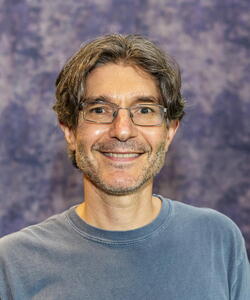Cosmic Gold: Neutron Star Collisions, Gravitational Waves, and the Origin of the Elements
Scientists have recently developed a new way to 'see' the universe, using gravitational waves predicted by Einstein over a century ago. These waves can teach us about some of the most exotic objects known, including black holes and neutron stars - objects which are very difficult to observe with conventional light-gathering telescopes, but are prodigious emitters of gravitational waves. Remarkably, they have also helped solve a longstanding puzzle about where in the Universe some of the elements we know and love here on Earth are produced, including gold, platinum, and uranium. Eliot Quataert will describe the exciting and remarkable new results emerging from our first steps into the gravitational wave era. (Top image via Wikipedia).
About Our Speaker

Eliot Quataert is a Professor of Astrophysical Sciences and the Charles A. Young Professor of Astronomy at Princeton University. Quataert is an astrophysics theorist who works on a wide range of problems, including stars and black holes, plasma astrophysics, and how galaxies form. He has received a number of national awards for his research, including the Warner Prize of the AAS, the Packard Fellowship, a Simons Investigator award from the Simons Foundation, and elected membership in the American Academy of Arts and Sciences and the National Academy of Sciences. Quataert is also a highly regarded teacher and public lecturer.
Quartaert was born in Santa Monica, California, lived for almost 12 years in Houston, Texas, and spent his high school years in Vestal, New York (upstate near the border between NY and PA). He received his B.S. in Physics from MIT in 1995 and a Ph.D. in Astronomy from Harvard University in 1999. He was a postdoc in the School of Natural Sciences at the Institute for Advanced Study for 2 years before joining the faculty at UC-Berkeley in 2001. He moved to Princeton in Fall 2020.
About the Iben Lecture Series
Founded in 1997 and named in honor of Distinguished Professor Emeritus Icko Iben Jr., the Icko Iben Jr. Distinguished Lecture Series brings a noted astronomer to campus to highlight some of the latest developments in astronomy in a forum geared for the general public.
Past Iben Lectures:
- Spring 2025: "Cosmic Alchemy and the Universe in Us," Professor Enrico Ramirez-Ruiz. Vera Rubin Chair of Astrophysics and Astronomy, UC-Santa Cruz. President of the Astronomical Society of the Pacific.
- Spring 2024: "Signals from the Beginning of the Universe", Professor Jo Dunkley. Joseph Henry Professor of Physics and Astrophysical Sciences, Princeton University.
- Fall 2023: "JWST: 25 Years to Build, One Year to Change Astronomy", Professor Marcia J. Rieke. Regents' Professor of Astronomy, Astronomer and Elizabeth Roemer Endowed Chair, Steward Observatory, University of Arizona
- Fall 2021: "Einstein’s Waves: Cosmic Sounds from Black Holes and Neutron Stars", Professor Vicky Kalogera, Daniel I. Linzer Distinguished University Professor
Department of Physics and Astronomy, Director of CIERA, Northwestern - Fall 2018: "The Universe Continues to Reveal Surprises", Dr. Wendy Freedman, John and Marion Sullivan University Professor in Astronomy and Astrophysics at the University of Chicago
- Spring 2018: "Exoplanets & The Search For Habitable Worlds," Dr. Sara Seager, Professor of Planetary Science, Physics, and Aerospace Engineering at the Massachusetts Institute of Technology
- Spring 2015: "What Scientists Know About The Big Bang," Dr. John E. Carlstrom, Subramanyan Chandrasekhar Professor of Astronomy, Astrophysics and Physics at the University of Chicago, and deputy director of the Kavli Institute for Cosmological Physics.
- Fall 2012: "The Galactic Center: Unveiling the Heart of our Galaxy," Andrea Ghez, University of California, Los Angeles
- Fall 2010: "Exploring the Dark Side of the Universe," Tony Tyson, University of California, Davis
- Spring 2009: "Dark Energy and the Runaway Universe", Alex Filippenko, University of California, Berkeley
- Fall 2008: "The World According to the Hubble Space Telescope", Mario Livio, STScI
- Spring 2006: "The Mars Exploration Rover Mission", Steven W. Squyres, Cornell University
- Fall 2004: "Massive Black Holes, or Gravity Strikes Back", Reinhard Genzel, Max-Planck Institute for Extraterrestrial Physics & University of California, Berkeley
- Fall 2003: "Cosmic Collisions: How Astronomers are Saving the World", David Morrison, NASA Ames Research Center
- Fall 2002: "The Search for Extraterrestrial Intelligence", William J. Welch, University of California, Berkeley
- Spring 2002: "Large Optical Telescopes: The Next Generation", W.L.W. Sargent, California Institute of Technology
- Fall 2000: "Are We Alone?", Steven Beckwith, Space Telescope Science Institute
- Fall 1999: "The Universe: Big, Old, Accelerating?", Robert P. Kirshner, Harvard University
- fall 1997: "Binary Pulsars and Einstein's Gravity", Joseph H. Taylor, Princeton University